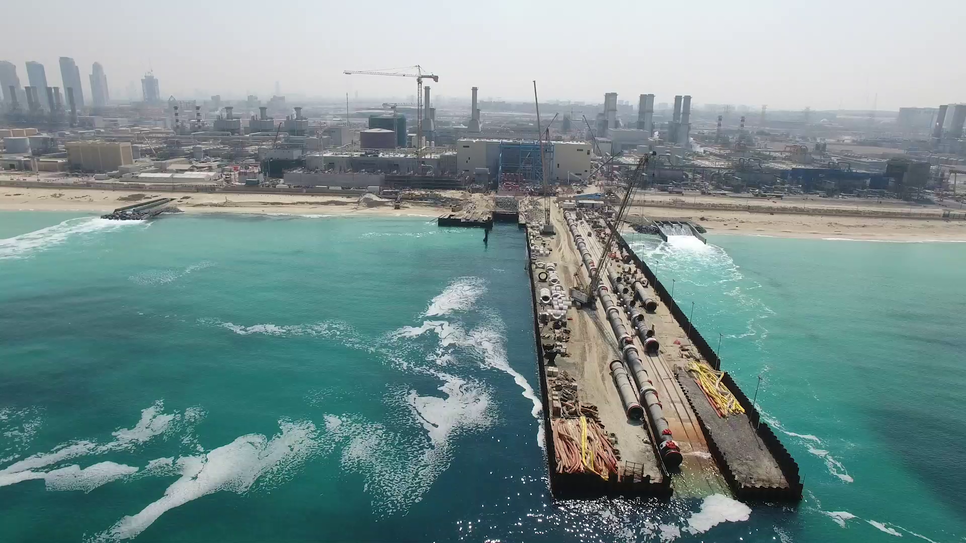DEWA upgrades water infra in the region through its projects
Published on by Water Network Research, Official research team of The Water Network in Business
DEWA has enhanced production to meet growing demand and provide services to over one million customers

Jebel Ali SWRO plant by Disha Dadlani
Dubai Electricity and Water Authority (DEWA) is accelerating efforts to develop a world-class infrastructure, supported by assets that exceed $49.5bn (AED182bn) owned by DEWA and its subsidiaries, and around $23.4bn (AED86bn) of investments in the energy and water sectors over five years.
Through its efforts, DEWA has enhanced its production capacity to meet the growing demand and provide its services to over one million customers according to the highest standards of quality, availability, reliability, and efficiency.
Water desalination plants
DEWA currently has 43 Multi-Stage Flash (MSF) water desalination units with a total production capacity of 445 million imperial gallons per day (MIGD) of water at the D, E, G, K, L, and M-Stations. It also has a Sea Water Reverse Osmosis (SWRO) plant with a production capacity of 25 MIGD. DEWA’s total production capacity of desalinated water is 470 MIGD. The water desalination units are located at the Jebel Ali Power Plant and Desalination Complex, which is one of the main pillars that provide Dubai with reliable, efficient, and high-quality electricity and water services.
At the end of 2020, sustainable infrastructure solutions provider ACCIONA achieved a key milestone in the construction of the Jebel Ali desalination plant, with the production of the first cubic meter of potable water.
The plant, equipped with energy-efficient SWRO technology, is a critical project in the modernisation of the water sector being undertaken by DEWA.
ACCIONA is the EPC contractor for Jebel Ali SWRO, which it expects to complete by 2021. The desalination plant will produce 182,000m3 of potable water per day, serving a population of 700,000 inhabitants. Its capacity makes it one of the largest desalination plants in the UAE.
Reverse-Osmosis water desalination technology
DEWA aims to increase its SWRO production capacity to 305 MIGD by 2030; reaching 41% instead of its current share of 5%. The desalinated water production capacity will reach 750 MIGD in 2030. SWRO desalination units require less energy than MSF. One of DEWA’s projects using this technology is at the Jebel Ali K-Station. The project, with a production capacity of 40 MIGD and investments worth AED 897 million, is scheduled for operation in Q1 of 2021.
The Independent Water Producer (IWP) model
DEWA has achieved a new world’s breaking record for the lowest water levelised tariff per cubic metre for its 120 MIGD Hassyan SWRO Plant. The project is DEWA’s first Independent Water Producer (IWP) model project. DEWA will commission the project in 2024.
Producing 100% of desalinated water by 2030 using a clean energy mix
By 2030, 100% of desalinated water will be produced by a mix of clean energy that uses both renewable energy and waste heat. DEWA’s initiative of decoupling water production and electricity generation uses a mix of clean energy, comprising of solar power and waste heat.
Storing desalinated water in a subterranean basin
DEWA is building a subterranean water basin to store 6,000 million gallons of water that can be retrieved when needed. This will provide the emirate with a strategic reserve of over 50 million gallons of water per day in emergencies, while ensuring the quality of the stored water remains unaffected by external factors.
Measuring water quality
DEWA ensures desalinated water quality through continuous monitoring across all stages of the desalination process. This ensure customers have access to drinking water that meets the highest international standards including that of the World Health Organisation for producing, transmitting and distributing drinking water.
Taxonomy
- Utility Management
- Public Utility
- Public Utility